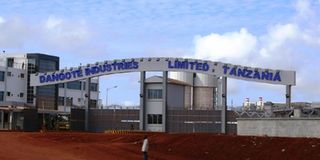Tanzania and Dangote still need each other

What you need to know:
The management of the $500 million cement plant cites high cost of production—occasioned by a ban on coal importation and lack of grid-connected power supply which has forced the company to rely on diesel generators—as some of the reasons behind the production stoppage.
For almost one week now, both the mainstream and social media have been awash with news regarding the suspension of production at the Dangote Cement Factory in Mtwara.
The management of the $500 million cement plant cites high cost of production—occasioned by a ban on coal importation and lack of grid-connected power supply which has forced the company to rely on diesel generators—as some of the reasons behind the production stoppage.
Yesterday, the company made light the disturbing situation by citing what it referred to as “non-critical technical issues”, but the fact is that, there is a problem between Dangote and the government that needs immediate resolution.
The current situation leaves more questions than answers. First, though it is within the government’s mandate to ban importation of coal from South Africa or elsewhere, why are we being told the local variety is more expensive than the imported one?
Similarly, provision of the right infrastructure (like roads, water and electricity) which supports businesses to thrive—is the responsibility of the government. Isn’t the Dangote plant—being a locally based corporate entity—entitled to the same?
What pledges did the government and Dangote give to each other when the investment deal was being negotiated? Is this not the right time to review implementation of the pledges to enable the Magufuli administration to know who is fooling who in this scenario?
Whether or not some “deal makers” are trying to cash in on this, the fact is: these arguments and counterarguments are painting a gloomy picture of Tanzania’s investment climate. And, needless to say, doesn’t augur well for a country geared at building an industrialised economy.
Tanzania, we aver, needs Dangote just as Dangote needs Tanzania. If need be, let heads roll, but a solution for this matter must be found sooner than later.
WE MUST WIN HIV/AIDS WAR
Every December 1, people across the globe commemorate the World Aids Day to raise public awareness on HIV/Aids. It is also the time to remember those whom it has killed and provide support to those living with it.
While it is estimated that 34 million people across the world are HIV-positive, 35 million are reported to have been killed by Aids-related complications, according to www.worldaidsday.org/.
This means that HIV/Aids is still one of the most destructive diseases which we must continue to fight relentlessly—and we must win.
The World Health Organisation (WHO) states that more than 18 million people living with HIV are taking antiretroviral therapy.
Almost the same, many people are unable to access it, and some of them might not even be aware they are HIV-positive. According to WHO estimates, this group comprises 40 per cent of all people with HIV (over 14 million).
Which is to say, despite the big strides that have been made in the fight against the scourge, especially after the arrival of the antiretroviral (ARV) therapy, we still need to change our behaviour, like avoiding multiple sexual partners and indulging in unprotected sex.
Let us reaffirm the message popularised during Jakaya Kikwete’s presidency: Tanzania without HIV/Aids is possible.




